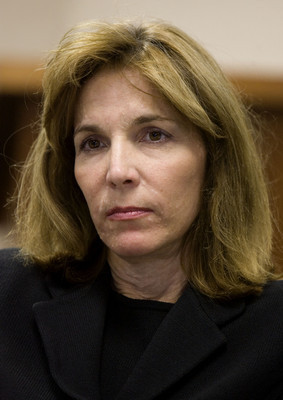Feral cat proposal discussed
A proposed code that would make it legal to tend feral-cat colonies stirred an emotional debate Tuesday between supporters and critics, most of whom described themselves as animal lovers.
The ordinance would allow people to run colonies of wild cats under guidelines that call for the felines to be sterilized, vaccinated and marked by clipping the tip of one ear. The cats would then be taken back to the colony.
Known as a "trap, neuter and return" program, it would essentially replace Clark County's practice of capturing free-roaming cats and hauling them to a shelter, where they are euthanized after two or three days.
Critics worry that fostering such colonies would lead to feral cats spreading disease and killing birds and other wildlife. Supporters contend that caring for these cats will curb their exploding population, prevent disease and reduce the area's rat infestation.
Commissioner Chris Giunchigliani, who proposed the code, said sterilizing animals will keep the numbers down better than killing them.
"We cannot euthanize our way out of not only cat populations but dog populations," Giunchigliani said.
The commission put off voting on the proposal to give town boards, animal-welfare groups, the animal-control advisory committee and other interested parties a chance to weigh in.
One state wildlife official argued that free-roaming cats can transmit a host of diseases to domestic animals, wildlife and humans.
"I don't think they (caregivers) can vaccinate for all diseases that cats carry," said Cris Tomlinson, supervising biologist for the state Department of Wildlife Diversity Bureau.
Feeding areas set up for feral cats could attract skunks, bobcats and other animals that carry diseases, Tomlinson said.
Also, fostering too many wild cats is bad for the ecosystem because they kill birds, small mammals and reptiles, he said. "They're predators."
But Tara Pike, local humane society volunteer, said feral cats are unlikely to spread diseases to humans because they won't go near people.
Pike said a change in policy is needed because animal control officers hinder efforts to reduce the feral cat population. Caretakers must be allowed to work in the open, without fear, she said.
Pike talked of how she trapped and neutered 50 cats at one mobile home park, preventing dozens of kittens from being born. But the residents got spooked when animal control threatened to punish them for tending the cats, so they stopped letting her trap and sterilize the felines, she said.
Still, Lester and Carol Stevens, who live in a mobile home and own cats and dogs, oppose the proposal.
They complained of how cats roaming wild in their park are a nuisance.
Many of them bother neighbors who have allergies and transmit ticks and fleas to house pets, Lester Stevens said.
But Giunchigliani said the proposed code would help remedy those problems. The purpose is not to propagate feral cats, but to keep them from multiplying and spreading disease, she said.
"This is the best way to make the feral cat populations eventually die out," she said.
Contact reporter Scott Wyland at swyland@reviewjournal.com or 702-455-4519.
COUNTY MANAGER FORGOES PAY RAISE
The reviews were heartfelt, even gushing at times, about how Clark County government is a better place with Virginia Valentine at the helm.
But as commissioners took turns Tuesday applauding Valentine's efforts to improve the beleaguered entity she took over two years ago, several of them lamented not rewarding the county manager with a pay raise.
Valentine will forgo a salary increase and continue to earn her current $206,700 a year. She said she couldn't bring herself to take a raise while the county struggles through a sluggish economy.
"It just sends the wrong message," she said.
Valentine is mirroring the recent decision of three top Las Vegas city officials to forgo pay raises, but said she made up her mind before the city leaders announced their plans.
City Manager Doug Selby, City Attorney Brad Jerbic and City Auditor Radford Snelding all rejected raises two weeks ago.
Commissioner Bruce Woodbury said he would give her high marks and reward her with a merit raise in a better financial situation.
"Hopefully for the good of the county, you'll stick around a while," Woodbury said.
Commissioner Lawrence Weekly lauded Valentine's integrity and said he felt blessed to have her as county manager.
"I think you've done well in two years," he said. "Clark County has been a very different place."
Weekly said he would like her to continue improving code enforcement, parks and pre-qualification of projects.
Valentine is doing a tougher job than many top administrators and is being paid less, Commissioner Rory Reid said. "If this were an Olympic event, the degree of difficulty would be as high as possible."
Valentine's annual pay is less than Henderson City Manager Mary Kay Peck's $225,000, Reno City Manager Charles McNeely's $255,000 and county Aviation Director Randy Walker's $238,000, according to a list compiled by the county.
Commissioner Chip Maxfield said Valentine is an engineer with compassion, understanding and people skills, all of which make her a good manager.
"There's a lot of things people can do with power," Maxfield told her. "You don't exercise that power in an unrighteous way."
REVIEW-JOURNAL

















